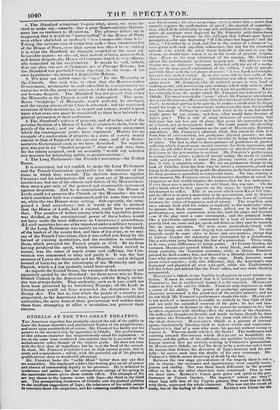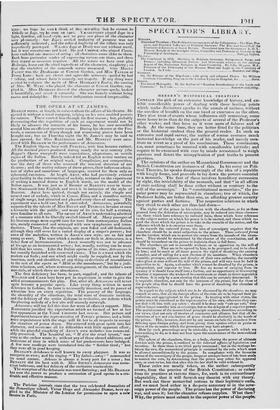OTHELLO AT THE TWO GREAT THEATRES.
TIIE American tragedian has promptly obeyed the call of the public to leave the human shambles and gladiatorial display of the amphitheatre, and enter upon anobler field of action. Mr. -FORREST has boldly put his powers to the severest test, by appearing in Othello. His performance of this arduous character has unquestionably raised his reputation : it has at the same time confirmed our opinion that be is an actor of the melodramatic order, though of the highest grade. Ile does not rank with the first class of tragedians, but he is at the head of the second. In short, Mr. FonaesT is indebted nut to high natural genius, but to study and acquirements; which, with the powerful aid of his physical qualifications, show to wonderful advantage.
Mr. FORREST looks the "noble Moor" better than any one that we remember. His manly and soldier-like bearing give an air of power and almost of commanding dignity to his presence. He is deficient in tenderness and pathos; but the extraordinary energy of his acting in the passionate scenes gives them terrific effect. The triumph of his art was shown in the famous scene with Iago—the third in the third act. The unsuspecting frankness of Othello, and his gradual yielding to the insidious suggestions of Ingo; the reluctance of his noble nature to entertain these vile suspicions, and his returning confidence when he sees lee:lemons ; his after misgivings, settling down into a doubt that i scarcely requires the confirmation of proof; the anguish of imps-ellen- ! slim, which finds relief only in rage and anticipations of revenge,—this series of emotions were depicted by Mr. FORREST With diStilletDeSS and power. Two passage: in the soliloquy that follows upon lago's promptires—the one beginnieg " If I do prove her haggard," and the other, " I'd rather be a toad, and live in the corner of u dmigeon "— were given us ith such appalling vehemence, that but for the unnatural attitude bite whirls the actor threw himself at the end to cup the climax, we should have taken it to be the result of genuine itemisa- tion. Even in the. very whirlwind of his passion, Mr. FORREST RiloWS tlw melodramatic performer to peep out. The address to the Senate was an eltiborate harangue, delivered with the air of u recitaa tion, rut the unprepared explanation of the soldier, " rude in speech, arid little blest with the set phrase of peace : " it was frank anttstraight- forward, bid sttillied withal. lit no one scene did UV lose sight of the viewer ami accomplished player. Admiratioe was often excited, spirt- . !lathy never. Mr. Foaers-r, like all artificial actors, is very fond of making points, and introducing new readinga, which only serve to show bow little the performer before itediffers from his predecessor. KEAN'. ha.; evidently been the model which Mr. Foaneer has followed in his Othello. The most remarkable " point " which air. FORRF:ST introduced, was where Desdemona offers to Idiot Othello's forehead with her handker- chief : instead of putting it by quietly, he makes a eirc16 with his finger round his head, as if to demonstrate mathematically that the keichief Wtis too small. Perhaps he would have bierl to tie it on, but that it might prove he was wrong; and then, what would have become of Iago's plot ? This is one of many instances of over-acting, less ludierous but not less out of place, that prove his conception to be of a literal, not tin imaginative kind. We could match the absurdity with a score of similar instances on the part of MACREADY, KEMBLE, and-others. Mr. FORREST'S admirers think that where he falls it is from her of over-exerting. his prodigious physical powers : we sus- pect he is too discreet to prove their mistake by being vehement out of place. The fact is, that in those passages of gentleness or passive suffering which depend upon mental emotion for their expression, and derive no aid either from personal appearance or physical exertion, the deficiency in the personation is evident. Mr. Foiteesr's performance is a congeries of points, a piece of mosaic acting, the result of careful study and practice ; but it wants the glowing current of passion to fuse it into a complete whole. We see no permanent change in the look of Othello, from the first titne he enters a conqueror, proud and happy in the possession of the gentle Desdernona, to the last scene, where his fiery passion is quenched in remorseful tears. No one, coming in at the moment Mr. Foneesr enters Desdemona's chamber to wreak his vengeance on her, would imagine the tortures that he has undergone :
if ever there was a murder done in cold blood, this was one. On the other hand, when he first appears on the stage, he looks like a man
foredoomed to suffer. This is an error which even KEAN fell into : and its effect is to give a monotony to the personation, and to deprive it of the most powerful and natural advantage—the force of contrast between the states of happiness and of misery. The tragedian puts on a solemn look with his robes, as regularly as the undertaker when he mounts his black streamer. Actors, indeed, are in the habit of performing—a most expressive , term this both for plays and funerals —as- if the play were a state ceremonial ; and the principal looks like a mysterious operator surrounded by a host of assistants, who gravely look on, come and go, speak and listen as they may be wanted, like so many automata. We were more particularly struck with this, by sitting out the same tragedy two successive nights. No two funerals could be more alike in forms amid ceremonies; except that at Covent Garden the solemnity was interrupted by a disturbance, likes refractory jarvy breaking the litte of a procession. There were, to be sure, sonic differences in minor points. At Covent Garden, for instance, MACREADY painted Othello a sooty black, and adopted, we think correctly, the Venetian costume; while at Drury, FORREST painted his flesh.a tawny hue, and dressed in -a Moorish costume, or at least what passes current for it on the stage. Both, however, wore green. velvet mantles ; with this difference, that the American's was festooned and plastered all over with gold, while the Englishman's fell flat before and behind like the Peers' robes, and was more chastely ornamented.
Maces:mars Othello is too familiar to playgoers to need minute cri- ticism. It must be conceded that it is inferior in physical power to FORREST'S; blIt in intellectual beauty it is far superior. Macaemer makes us feel with and for Othello. FORREST only impresses us with a sense of his ability. The power of producing sympathy for the character personated, is the grand test of the actor's powers; and we do not think Mr. Foniteer's performance stands this test. MACREADY is too MUCii of a maimeriat to enable us entirely to lose sight of him and see only the embodied creation of the poet: he has not ima- gination enough to become in idea the person he assumes to be; but he often expresses with thrilling effect the emotions of the character. He makes the thoughts to breathe and words to burn, though he does not infuse the Promethean fire into the form with which he clothes the ideal character. MACREADY"S Othello is a picture of internal agony, involuntarily bursting forth in violent action and expression. FORREST'S is that of a man who vents his passion without caring to repress it. Who can doubt which is the finest? The tenderness and yearning towards Des lemona which MACREADY so beautifully ex- presses, and the pathos of his sufferings, are qualities heightening the human interest that are entirely wanting in FORREST'S personation.- In MACREADY'S Othello, we feel his death to be a welcome relief from the torture that follows his discovery of Iago's knavery and his own folly : he seems sunk into the depths of his own contempt. Mr. FORREST'S Othello seems deserving of death by the law. Between the two stage presentations of the tragedy there is not at pin to choose : the costumes and appointments were equally incon- gruous and shabby. Nor was there much difference in the general effect so far as the other characters were concerned. One or two we must note. KEMBLE'S Cassio gave grace and spirit to the per- formance at Covent Garden. His inquiry," where are they?' when lago tells him of the Cyprus gallants that want him to drink with them, expressed the whole character. This was not the result of study, but of the feeling of the moment. KEMBLE was Cassio for the • time: we hope be a out think of denamsbatitig that he cannot be Othello or Ingo, try be eaer so Lard. li'ANDENI1OFF played logo in a light, familiar, off-heed style, and so gave one phase of the character very pleasantly : but kyo's settled malignity of purpose was not sufficiently indicated ; and the refined duplicity of the villain was only imperfectly portrayed. Waal:es /ago at Drury was not without merit. but it was mouotopous and hard. Ile and eooesa, who played Cassio, have each but one manner of meting: all characters come alike to them. Both have particular modes of explessing various em, tions, and these they repeat as oreasion requites. All the Hams we have seen play Boderigo, leave out the chief ingredient of the character, simplicity ; so that the credulity of the coxcomb seems unnatural. Atiss HELEN FAUCIT was the Desdemona at Covent Garden, and Miss TAYLOR at Drury Lane : both are clever and agreeable actresses spoiled by bad • !chine, and whose forte is comedy. Hot tragedy. If any thing were needed to enhance the merit of Miss HUDDART'S Etuit.:a. the ranting of Mrs. W. W vat% who played tlie character at Covent Garden, sup. Flied it. Miss Hoonsiti dtet d the chmacter picturesquely, looked it beautifully, and acted it earnestly. She was homely without being coarse and unladylike. Her honest indignution seemed irrepressible.



























 Previous page
Previous page